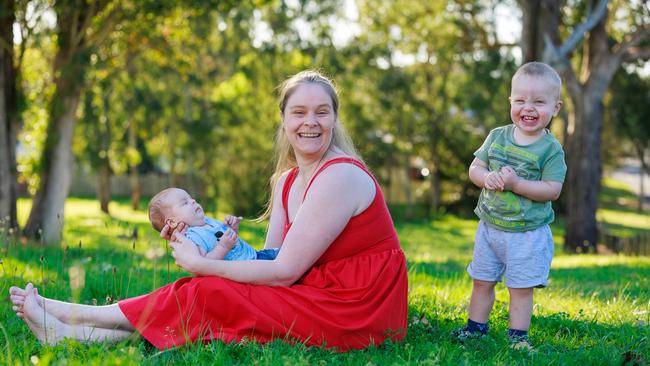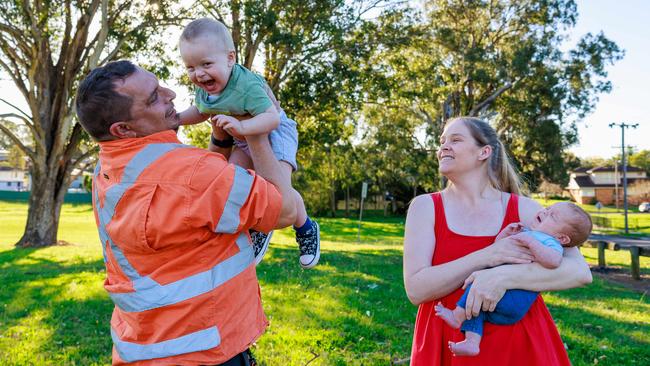Britta Jordan reveals true cost of IVF after spending $150,000 to have miracle babies
Britta Jordan and her husband Marc thought their dream of having children was over after they spent a crippling $150k on IVF treatment but then they found a solution - at a quarter of the price.
NSW
Don't miss out on the headlines from NSW. Followed categories will be added to My News.
It took Britta Jordan several years, $150,000, a refinanced mortgage and upwards of 10 failed IVF attempts to finally get her miracle babies.
A record one in 18 babies born in Australia is now conceived via IVF — but experts and mums such as Ms Jordan say the costs associated with the process are still far too high.
Ms Jordan and her husband Marc got married a decade ago and immediately started trying for a baby but after several years and no baby they decided to try IVF.
She initially went with a private clinic, and went through eight agonising, failed attempts to fall pregnant.
“IVF is pure horror, every woman who has been through it would say the same,” she told the Telegraph through tears.

“All you want is to see two positive lines and it never happens.
“I remember driving around and seeing women with babies everywhere and it just breaks your heart when it’s all you want.”
As time went on, her tears and distress around the failed attempts to conceive instead became about her family’s dwindling savings — and they decided to stop the process.
“We spent huge amounts of money – around $150,000 – and refinanced our house to keep going,” she said.
“Then we started thinking we wouldn’t even have any money to raise a baby. It’s a really impossible and hard choice.”
The average out-of-pocket costs of a single IVF cycle can cost up to $7000, depending on the individual treatment requirements. Given that many women require several cycles before becoming pregnant, this amount can put a significant dent in anyone’s budget.
Mr and Mrs Jordan decided that they’d have one final attempt however — after hearing through a mother’s group about bulk-billing Sydney clinic Adora Fertility, which charges 75 per cent less than full fee clinics.

After three rounds – and little more than a couple of thousand dollars – she fell pregnant with her miracle baby.
“That feeling was unbelievable,” she said. “I will never forget it. Just the joy, but also the fear and anxiety.”
Nine months later, little Ethan was born on Christmas Day, “our best present ever”, according to Ms Jordan.
Keen for her boy to become a big brother, 10 months later she underwent another round of IVF with Adora and fell pregnant with baby boy Lincoln.
“I never thought this would happen, as much as I wanted it to, I still have to pinch myself,” she said.
“But it upsets me that I wasted all that money, and I have to work really hard to make it back for my babies.”
While Medicare rebates in Australia are available to those diagnosed with medical infertility, with no limit on the number of cycles a patient can undergo and receive rebates for, it’s becoming a process that is far too expensive for many women.

CEO of The Fertility Society Dr Petra Wale said the rebates didn’t go far enough, and were still out of reach for many women.
“Australians are having to make difficult choices in many aspects of life due to the cost-of-living crisis and sadly decisions regarding IVF are no different,” she said.
“While Medicare rebates and programs such as public IVF services do provide some relief, the existing support are not sufficient for many families.
Dr Wale said the Fertility Society was actively involved in a Comprehensive Review of Governance and Standards in the ART and IVF sector – and hoped to see it better regulated, with lower costs.
“We are committed to … creating a national fertility plan that ensures safe, effective, and equitable access to fertility treatments for all.”
Adora Fertility CEO Vanessa Ferguson said the bulk-billing service has experienced a boom in new patients searching for more affordable options, particularly from regional NSW.
“Facing infertility is difficult enough without having to worry about how to afford treatment and we believe cost shouldn’t be a barrier to accessing high quality fertility care,” she said.
“There’s a cost-of living crisis going on and people are really exploring their options and what they can afford.”
Got a news tip? Email weekendtele@news.com.au





